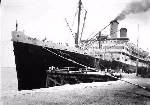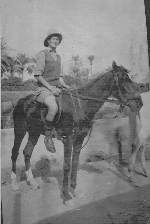Part 1 - Off to War Before the war I worked as a tailor’s cutter for Boult Brothers in St Pauls Street, Leeds and lived in Ravensburg Street, off Kirkstall Road, one hundred yards from the River Aire. I was a member of the TA, joined it in 1938. When war came I was 19 years old and single. My call up papers arrived 2 days before war was declared – 2575376 Signalman, Royal Corps of Signals, 49th Division. For the first couple of weeks I was based at Gibraltar Barracks, then LeedsGirlsHigh School and for a month in GoldenAcrePark. Just before Christmas we moved camp to Masham and remained there till the end of January 1940. Then it was off to war, on a troopship, the liner Reno del Pacifico, to Harstadt in the LofotenIslands. The Germans were expected to make their way up the coast of Norway and we were landed at various points on the Norwegian coast to stop them. The LofotenIslands are 200 miles inside the Arctic Circle and guard the sea lanes into Narvik, a major rail link and seaport for exporting Swedish iron ore, ice free in winter because of the Gulf Stream.  First impression was there wasn’t much in Harstadt. The snow was 10ft deep, but when it melted, beneath the footpaths we’d used, buildings buried deep by the snow slowly reappeared. We were joined by units of the French Foreign Legion and several Guards regiments. We moved closer to Narvik to try to defend it from the advancing Germans. We didn’t have any artillery, it had all been shipped off to defend Iceland. The Royal Navy controlled the sea, many German destroyers, cargo ships and U boats had been sunk in various clashes in these waters. But the land battle was less successful. Eventually the order was given to withdraw. From the hillside I watched one of our destroyers in flames, break in half and sink. We destroyed our equipment and returned to Harstadt where we drove our vehicles off the cliffs into the sea. The navy came in to evacuate us. It seemed as if every second ship was on fire or sinking. Luckily I managed to get back to the UK safely, landing in Melrose, Scotland. We were all given 48 hours leave but after just 24 hours I received a telegram recalling me. The regiment was re-equipping, to be sent off to Iceland. But at the last minute I was told I was being left behind to look after the radio station in Melrose. I was there for about 2 months before being sent to the Air Formation Signals Group in Orpington, Kent. They needed signallers if the invasion was coming. The Battle of Britain was just starting. For two months we trained in the fields of Kent, watching the aeroplanes fighting it out overhead. I received a posting to the 97th Field Regiment of the Kent Yeomanry, stationed in Great Bentley in Essex. They had 25lb field guns deployed to prevent a likely invasion across the flat beaches and plains of Essex. They were a posh lot, the officers were all lords and minor royalty. When the threat of invasion passed we were packed off to Swansea and on to Builth Wells for more training. Then orders arrived to pack up and we were put on a train to Gourock, near Glasgow. We boarded a troopship, SS Orontes, and waved off by dockers, sailed out into the Clyde to join a convoy heading for Iceland. But our convoy sailed on past Iceland, west across the Atlantic, down the east c oast of America without stopping then back across the Atlantic to West Africa, finally halting in Freetown, Sierra Leone to refuel. The estuary of the Rockel river where we dropped anchor was muddy yellow and local youths would row out and dive for coins thrown from the ships by onlooking soldiers. They’d dive deep and eventually resurface holding up the coin and shouting ‘Glasgy tanner’. oast of America without stopping then back across the Atlantic to West Africa, finally halting in Freetown, Sierra Leone to refuel. The estuary of the Rockel river where we dropped anchor was muddy yellow and local youths would row out and dive for coins thrown from the ships by onlooking soldiers. They’d dive deep and eventually resurface holding up the coin and shouting ‘Glasgy tanner’. Quickly we were off again zigzagging down the African coast to Cape Town. On the docks in Cape Town was a long line of civilian cars waiting for us. A young woman called me and three of my mates over and invited us for dinner. Her home was a huge house, with servants, in Simonstown, on a peninsular with the Atlantic to one side and the Indian Ocean on the other side. By coincidence her mum was from Yorkshire. We stayed with the family for 2 days. She wrote to my mum all through the war, checking up on how I was doing. We were in Cape Town for 2 weeks, sleeping on the ship but allowed off to sightsee, though warned to ‘stay clear of area 5, it isn’t safe for white folk’. Finally we set sail again and once we were out in the Indian Ocean the convoy split, half the ships heading for Singapore and the rest, including my ship, bound for Bombay. The troops sailing for Singapore were destined for capture and imprisonment by the Japanese. Arriving safely, we disembarked into a camp. We were allowed out of camp to look round and visit the local tourist attractions. It was very hot and very crowded everywhere. One night I went to the cinema. It was non-smoking! A couple of weeks later we boarded a proper troopship and set sail, hugging the coastline up into the Persian Gulf, finally docking in Basra. We were now living under canvas under a hot sun and freezing nights, encountering scorpions and dysentery for the first time whilst waiting for our equipment to be unloaded. We then set off, following sand tracks through the desert for two weeks till we came to Habbaniyah, a large shallow freshwater lake west of Baghdad, where we set up camp. There, we had shooting practice at boats towed along out in the lake. Next morning we were able to pick up dead fish, killed by the firing and washed ashore during the night. There was a large RAF base at the lake which was used by Sunderland flying boats stopping to refuel on their way from England to India. Whilst we were there I swam all the way across the River Euphrates. We were given leave in Baghdad, staying in the local YMCA. Me and my mate Wilf hired horses from a stable in Rashid Ali Street. I’d never been on a horse before.  Wilf said give it a kick so I did and off it bolted into one of those districts we were warned to stay clear of. Fortunately it was daylight and I was able to find my way back safely. We also had a trip up to Mosel to visit some underground emplacements built during the First World War. Wilf said give it a kick so I did and off it bolted into one of those districts we were warned to stay clear of. Fortunately it was daylight and I was able to find my way back safely. We also had a trip up to Mosel to visit some underground emplacements built during the First World War. Our group reformed and we set off for the Western Desert. We followed a pipeline west through the desert then crossed the River Jordan. Suddenly everywhere was lush and green. Better still, the local girls were westernised. Things were looking up. We travelled on to Palestine where I swam in the Sea of Galilee and we moved on to the coastal resort of Netanya near Tel Aviv. The beaches were beautiful and lined with little cafes. I remember going into a café for breakfast. ‘Bacon sandwich please’ I said. The waitress looked at me blankly and asked ‘What is bacon?’. We continued on across Sinai, over the Suez Canal and in convoy through the streets of Cairo. We weren’t well received in Cairo, there were jeering crowds, I remember an Arab spat in my face. We drove on to El Alamein and then out into the desert. I was now a Desert Rat. Next time : Captured |